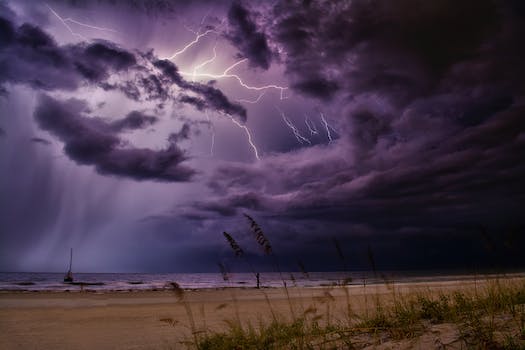-
Table of Contents
- Introduction
- How to Prepare for Extreme Weather Conditions When Traveling
- What to Pack for Extreme Weather Travel
- Tips for Staying Safe During Extreme Weather Events
- How to Protect Yourself from Natural Disasters While Traveling
- Strategies for Dealing with Extreme Weather Conditions While Traveling
- Conclusion
“Stay Safe and Enjoy Your Extreme Weather Travel with nishankhatri.xyz’s Expert Tips and Precautions!”
Introduction
Extreme weather travel can be a thrilling and rewarding experience, but it can also be dangerous if you don’t take the necessary safety precautions. Whether you’re planning a trip to a tropical paradise or a winter wonderland, it’s important to be aware of the potential risks associated with extreme weather conditions. In this article, we’ll provide some essential safety tips and precautions to help you stay safe while traveling in extreme weather. We’ll cover topics such as preparing for your trip, packing the right gear, and staying safe during your travels. With these tips in mind, you can enjoy your extreme weather travels with peace of mind.
How to Prepare for Extreme Weather Conditions When Traveling

Extreme weather conditions can be a challenge when traveling, but with the right preparation, you can stay safe and enjoy your trip. Here are some tips to help you prepare for extreme weather conditions when traveling:
1. Research the Weather: Before you leave, research the weather in your destination. Check the forecast for the days you’ll be there and plan accordingly. If you’re expecting extreme weather, such as high temperatures, heavy rain, or snow, make sure you’re prepared with the right clothing and gear.
2. Pack Appropriate Clothing: Pack clothing that is appropriate for the weather conditions you’ll be facing. If you’re expecting cold weather, bring a coat, hat, gloves, and other warm clothing. If you’re expecting hot weather, bring light, breathable clothing and a hat to protect you from the sun.
3. Bring the Right Gear: Depending on the weather conditions, you may need to bring additional gear. If you’re expecting rain, bring an umbrella or raincoat. If you’re expecting snow, bring a shovel and other snow gear.
4. Stay Hydrated: Extreme weather can be dehydrating, so make sure you stay hydrated. Bring plenty of water and other drinks with you and drink regularly throughout the day.
5. Take Breaks: If you’re traveling in extreme weather conditions, take regular breaks to rest and cool down. Find a shady spot or an air-conditioned building to take a break from the heat or cold.
By following these tips, you can stay safe and enjoy your trip, even in extreme weather conditions. With the right preparation, you can make the most of your travels and have a great time.
What to Pack for Extreme Weather Travel
When traveling to extreme weather destinations, it is important to pack the right items to ensure a safe and comfortable journey. Here are some essential items to consider packing for extreme weather travel:
1. Clothing: Pack clothing that is appropriate for the climate. For cold weather, pack layers of warm clothing such as sweaters, jackets, hats, gloves, and scarves. For hot weather, pack lightweight, breathable clothing such as shorts, t-shirts, and sandals.
2. Sun Protection: If you are traveling to a hot climate, make sure to pack sunscreen, sunglasses, and a hat to protect yourself from the sun’s harmful rays.
3. Footwear: Pack shoes that are appropriate for the climate. For cold weather, pack boots that are waterproof and insulated. For hot weather, pack sandals or lightweight shoes that will keep your feet cool.
4. Rain Gear: If you are traveling to a wet climate, make sure to pack a raincoat, umbrella, and waterproof shoes.
5. First Aid Kit: Pack a first aid kit with basic items such as bandages, antiseptic wipes, and pain relievers.
6. Flashlight: Pack a flashlight in case of power outages or if you need to navigate in the dark.
7. Water Bottle: Pack a reusable water bottle to stay hydrated during your travels.
By packing the right items for extreme weather travel, you can ensure a safe and comfortable journey.
Tips for Staying Safe During Extreme Weather Events
Extreme weather events can be dangerous and unpredictable, so it’s important to take the necessary precautions to stay safe. Here are some tips to help you stay safe during extreme weather events:
1. Stay informed: Make sure you stay up to date on the latest weather forecasts and warnings. Monitor local news and weather reports for updates on the situation.
2. Prepare an emergency kit: Have an emergency kit ready with essential items such as food, water, flashlights, batteries, and a first aid kit.
3. Have a plan: Have a plan in place for how you and your family will respond to an extreme weather event. Make sure everyone knows what to do in case of an emergency.
4. Secure your home: Make sure your home is secure by checking for any potential hazards such as loose branches or debris.
5. Stay indoors: If possible, stay indoors during extreme weather events. If you must go outside, be sure to wear appropriate clothing and stay away from downed power lines and other hazardous areas.
6. Avoid flooded areas: Do not attempt to drive or walk through flooded areas. The water may be deeper than it appears and can be dangerous.
7. Follow evacuation orders: If you are instructed to evacuate, do so immediately. Follow the instructions of local authorities and leave the area as soon as possible.
By following these tips, you can help ensure your safety during extreme weather events. Stay safe!
How to Protect Yourself from Natural Disasters While Traveling
Traveling can be an exciting and rewarding experience, but it can also be dangerous if you’re not prepared for natural disasters. Natural disasters can strike at any time, and they can be especially dangerous if you’re in an unfamiliar place. To protect yourself from natural disasters while traveling, here are some tips to keep in mind.
1. Research the area you’re visiting. Before you travel, research the area you’re visiting to learn about any potential natural disasters that could occur. Find out what type of disasters are common in the area, such as hurricanes, floods, earthquakes, or tornadoes. Knowing what to expect can help you prepare for the worst.
2. Have an emergency plan. Make sure you have an emergency plan in place before you travel. Have a plan for where you’ll go if a natural disaster strikes, and make sure you have a way to contact family and friends in case of an emergency.
3. Pack an emergency kit. Pack an emergency kit with items such as a flashlight, first aid kit, water, non-perishable food, and a battery-powered radio. This will help you stay safe and comfortable if you’re stuck in an unfamiliar place during a natural disaster.
4. Stay informed. Make sure you stay informed about the weather and any potential natural disasters in the area. Listen to local news and weather reports, and follow any instructions given by local authorities.
5. Have travel insurance. Make sure you have travel insurance in case of an emergency. Travel insurance can help cover the costs of medical care, lost luggage, and other expenses if you’re affected by a natural disaster.
By following these tips, you can help protect yourself from natural disasters while traveling. Remember to stay informed, have an emergency plan, and pack an emergency kit. And don’t forget to get travel insurance to help cover any unexpected costs.
Strategies for Dealing with Extreme Weather Conditions While Traveling
Extreme weather conditions can be a major obstacle when traveling, but there are ways to prepare and stay safe. Here are some strategies for dealing with extreme weather conditions while traveling:
1. Check the forecast: Before you leave, check the forecast for your destination. This will help you plan ahead and pack the right clothing and supplies.
2. Dress appropriately: Make sure you dress for the weather. Wear layers so you can adjust to changing temperatures.
3. Bring the right supplies: Pack items such as sunscreen, sunglasses, and a hat to protect yourself from the sun. If you’re traveling in cold weather, bring a warm coat, gloves, and a hat.
4. Stay hydrated: Drink plenty of water to stay hydrated. Avoid alcohol and caffeine, which can dehydrate you.
5. Take breaks: If you’re traveling in extreme heat, take frequent breaks in the shade or air-conditioned areas.
6. Listen to local advice: If you’re traveling in an area with extreme weather, listen to local advice. They may have tips on how to stay safe in the conditions.
By following these strategies, you can stay safe and enjoy your travels despite extreme weather conditions.
Conclusion
Extreme weather travel can be a dangerous endeavor, but with the right safety tips and precautions, it can be a safe and enjoyable experience. It is important to be aware of the potential risks associated with extreme weather travel and to take the necessary steps to ensure your safety. By following the safety tips and precautions outlined in this article, you can ensure that your extreme weather travel is a safe and enjoyable experience.















